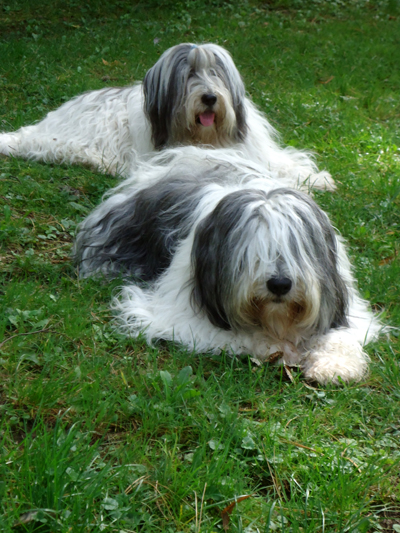Winter Care for PONS
Winter's cold temperatures brings many concerns for responsible PON
owners. The following precautions need to be kept in mind:
Avoid leaving your PON outside in the cold for long periods of time.
Wind chill makes days colder than actual temperature readings. Be
attentive to your PON's body temperature, and limit it's time
outdoors. Although PON's are a double coated breed, they can still
experience serious chills.
Adequate shelter is always a necessity. Keep your PON warm, dry and
safely away from drafts. Tiles and uncarpeted areas may become
extremely cold, so make sure to place blankets and pads on floors in
these areas. Also, avoid over heating the house.
Be extremely careful when walking or playing with your PON near
frozen lakes, rivers or ponds. Your PON could slip or suddenly jump
in and become seriously injured.
Groom your PON regularly. Your PON needs a well-groomed coat to stay
properly insulated. Your PON's should have excess hair around the
toes and foot pads trimmed to ease snow removal and cleaning. If you
do the trimming, be careful not to cut the pads or other delicate
area of the foot. Seek out a professional grooming if you are not
skilled with trimming pads.
Offer your PON a good quality diet to cope with cold weather months.
It takes more energy in winter to keep body temperature regulated,
so a diet rich in vitamins and minerals is necessary.
Blow-dry your PON if he gets wet from rain or snow. It is important
to dry and clean paws, as well. This helps avoid tiny cuts and
cracked pads. A little petroleum jelly may soften the pads and
prevent further cracking.
Never leave your PON alone in a car. If the car engine is left on,
the carbon monoxide will endanger your PON's life. If the engine is
off, the temperature in the car will get too cold.
PON cannot talk to us when they become ill. As a responsible PON
owner, it is important to pay special attention to your PON's
well-being during the winter season. Remember the following health
concerns:
Antifreeze, which often collects on driveways and roadways, is
highly poisonous. Although it smells and tastes good to your PON, it
can be lethal.
Rock salt, used to melt ice on sidewalks, may irritate footpads. Be
sure to rinse and dry your PON's feet after a walk.
Always provide lots of fresh water. Your PON is just as likely to
get dehydrated in the winter as in the summer. Snow is not a
satisfactory substitute for water. Heated houses are often dry
houses and water requirements for PONS remain the same as during
summer months.
Frostbite is your PON's winter hazard. To prevent frostbite on its
ears, tail and feet, don't leave your PON outdoors for too long.
Inspect feet, ears and tails (in Europe).
Be extremely careful of supplemental heat sources. Fireplaces and
portable heaters can severely burn your PON. Make sure all
fireplaces have screens, and keep portable heaters out of reach.
Like people, many PONS seem to be more susceptible to illness during
the winter. Take your PON to a veterinarian if you see any
suspicious symptoms.
Don't use over-the-counter medications on your PON without
consulting a veterinarian.

